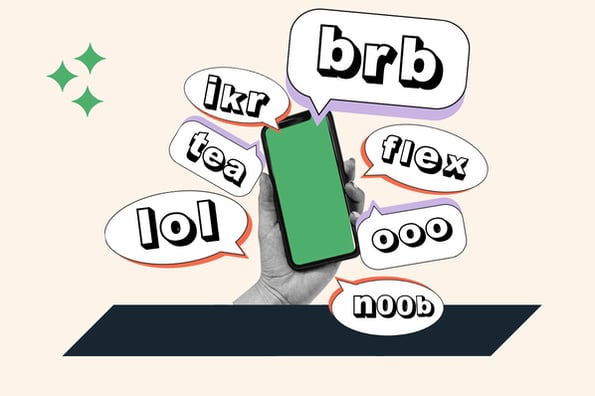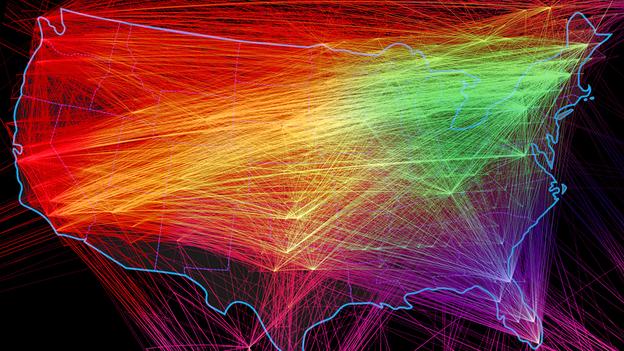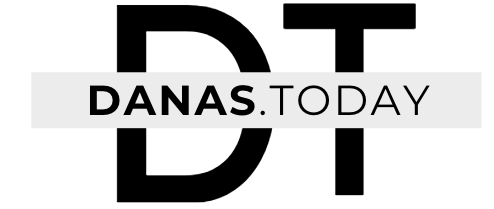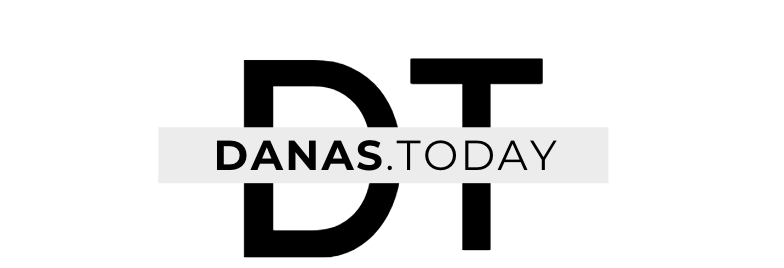Web slang spreads like wildfire and generally appears to come back out of nowhere. Some are short-lived, some are utilized in area of interest communities, however some go as far as to be included in dictionaries.

Whether or not you spend time on-line as an informal person or a marketer enacting a social media technique, you wish to know what completely different slang and abbreviations imply.
On this put up, we’ll talk about how web slang originates and spreads, outline 81 slang phrases you may come throughout, and description what it takes for slang to be added to our dictionaries.
Desk of Contents
Is the Web to Blame?
As we spend much less time listening to the radio or watching TV and extra time on-line, the latter has probably the most affect on our day-to-day dialogue.
The quick tempo of the web additionally means we undertake phrases a lot quicker than ever earlier than. “Language itself modifications slowly, however the web has sped up the method of these modifications so that you discover them extra rapidly,” David Crystal, honorary professor of linguistics on the College of Bangor, instructed BBC Information. You’ll be able to think about how for much longer it took new phrases to unfold by word-of-mouth than it does in the present day with the web.
How Slang Spreads on the Web
Linguistics and anthropologists have studied how slang spreads for many years, however it was solely potential to measure with precision as soon as public social media networks emerged.
Platforms assist linguists precisely and simply search and file language exchanges. For instance, Jacob Eisenstein and his colleagues on the Georgia Institute of Expertise examined 30 million tweets from the U.S. to pinpoint the origin of common slang phrases and their unfold. The picture under is the ensuing map that reveals how phrases migrated and their path of affect.

Slang now strikes round inside weeks and months as an alternative of years, says Julia Coleman, creator of The Lifetime of Slang. “It isn’t essentially that language is altering extra rapidly, however applied sciences have developed and so they permit the transmission of slang phrases to go from one group to a different far more rapidly.”
Web Slang Across the World
The web impacts the event of language all internationally.
In Ukraine, Svitlana Pyrkalo says the force-quit technique of urgent management+alt+delete is called Дуля (dulya). A dulya is a Ukranian gesture utilizing two fingers and a thumb, utilized in the identical conditions through which we‘d give “the finger.” “And also you want three fingers to press the buttons,” says Pyrkalo. “So it’s like telling any individual, a pc on this case, to get misplaced.”
Different international locations have their very own variations of “LOL.” In France, “mdr” stands for “mort de rire,” which means dying of laughter. The Swedish write “asg” as an abbreviation of Asgarv, which means intense laughter. The quantity 5 in Thailand signifies the letter “h,” so 555 is “hahaha.”
It’s vital to notice that a whole lot of common web slang comes from African-American Vernacular English (AAVE), a type of English spoken by Black People. Usually, Black individuals have conversations on-line, different individuals use the phrases, and so they turn out to be a part of on a regular basis web converse.
With all of this in thoughts, let’s evaluation among the hottest web slang phrases, lots of that are acronyms and others full phrases and phrases.
Web Slang Phrases
Basic Web Slang
1. Acct
Acct is brief for account.
2. BC
BC stands for as a result of.
3. Guess
Guess has a number of meanings, one being a easy “sure” or a response of settlement, however it will possibly additionally imply “It’s on” as a response to one thing you don’t consider is true.
For instance, somebody says, “I can do that higher than you,” and somebody responds, “Alright, guess.”
4. BRB
BRB stands for be proper again.
5. BTW
BTW stands for by the way in which.
6. Down
Down means “sure,” or a response demonstrating that you just’re up for or concerned with one thing.
For instance, “Who needs to go to the films?” “Down.”
7. Flex
Flex means displaying off. Sometimes individuals say, “Bizarre flex however okay,” to react to somebody displaying off or bragging about one thing in poor style.
8. FOMO
FOMO stands for concern of lacking out, and that i’ts used when somebody is fearful about not being invited someplace or isn’t a part of an expertise.
It’s additionally used as an lively verb, like “Everybody’s on the live performance, and I’m having FOMO.”
9. FYI
FYI stands to your info.
10. Goat
Goat means best of all time. Individuals additionally say goated to imply the identical factor. For instance, “Messi is the goat,” or “Messi is goated.”
11. GTG or G2G
GTG and G2G stand for obtained to go.
12. Highkey
Highkey describes one thing manifestly apparent and true that doesn’t should be hidden. It’s the other of lowkey.
For instance, “That was highkey the very best meal I’ve ever had,” or “I highkey want tickets to the present.”
13. IKR
IKR stands for I do know, proper?
14. IMHO
IMHO stands for in my trustworthy opinion or in my humble opinion.
15. IRL
IRL stands for in actual life.
16. Iykyk
Iykyk stands for “If you already know, you already know,” and it’s a descriptor for an inside joke or one thing area of interest that applies to a selected group of individuals.
17. JK
JK stands for simply kidding.
18. JOMO
JOMO stands for pleasure of lacking out, and it is used when somebody is unbothered by not being invited someplace/lacking an expertise or is comfortable as a result of they weren’t to start with. The other of FOMO.
19. Okay
Okay means okay, however can be used when somebody is pissed off and is placing an finish to a dialog.
20. L
L means loss or loser, and it’s normally stated when somebody has failed at one thing or a state of affairs hasn’t gone their method, like “I took an L final evening.”
If individuals don’t agree with one thing they see on-line, they may remark “L” to convey their level.
21. LMK
LMK stands for let me know.
22. LOL
LOL stands for snort out loud.
23. Lowkey
Lowkey has a number of meanings.
- When somebody is barely or reasonably bothered by one thing, however it isn’t an enormous deal: “I’m lowkey unhappy I missed the present, however there’s all the time subsequent time.”
- When one thing must be saved secret, discreet, and never shared outdoors of the dialog: “Lowkey, I’d stop.”
- To explain a mellow or low-stakes state of affairs: “It was a lowkey celebration with my closest mates.”
24. Mid
Mid means common or under common. It’s normally a dig at somebody or one thing, like, “That film was mid.”
25. NBD
NBD stands for no huge deal.
26. OOTD
OOTD stands for outfit of the day.
27. Photobomb
Photobomb means getting into somebody’s image or video uninvited, normally on goal.
28. Prolly
Prolly is slang for most likely.
29. Salty
Salty means upset or bothered.
30. TFW
TFW stands for that feeling when.
31. TBH
TBH stands for to be trustworthy.
32. TL;DR
Individuals use it earlier than giving a abstract when telling a narrative or sharing info. Individuals additionally remark TL;DR to say they gained’t learn one thing as a result of it’s too lengthy.
33. TGIF
TGIF stands for thank god it’s Friday.
34. TMI
TMI stands for an excessive amount of info.
35. Troll
A troll is somebody who purposely sparks controversy on the web. Somebody may say, “Ignore that remark; he’s only a troll.”
36. W
W stands for win, and it’s used when somebody has gained one thing, or one thing good has occurred, like “How was your sport final evening?” “It was nice we obtained the W!”
The other of L.
Social Media Web Slang
1. AMA
AMA stands for asking me something. It originated on Reddit, the place somebody well-known has an AMA session the place discussion board audiences can submit questions for them to reply.
2. Anon
Anon is brief for nameless.
3. ASMR
ASMR stands for autonomous sensory meridian response, and it’s any video or audio content material that gives a soothing and satisfying feeling to viewers.
4. Bot
A bot is an account that shares spammy and undesirable content material or an individual who shares undesirable content material or is unhealthy at one thing.
5. Bump
Somebody says “Bump” to push a remark or put up again to the forefront of a thread or remark part.
6. Caught in 4K
Caught in 4K means to catch somebody red-handed.
7. DM
DM stands for direct message.
8. Doomscrolling
Doomscrolling describes spending countless time scrolling by your social media feeds, normally by grim information tales.
It may possibly additionally imply getting caught scrolling by content material for a big period of time.
9. FB
FB stands for Fb.
10. Deal with
A deal with is a username on any social media.
11. Hashtag
Hashtag (#) is a method that folks discover content material on social media. Generally individuals say hashtag out loud in an ironic method, like “Hashtag yummy” whereas consuming.
12. Icon
An icon is an image on social media, normally a profile image.
13. IG
IG stands for Instagram.
15. Lurker
A lurker is lively on social media or particular channels however by no means feedback or participates within the dialog.
16. N00b
N00b is slang for amateur, and it’s a descriptor for somebody who’s a newbie or new to one thing. Individuals name themselves a n00b, and saying it to another person means they’re ignorant or unhealthy at one thing.
It’s additionally spelled noob or newb.
17. OP
OP stands for authentic poster, and it’s the one that began a dialog on social media or was the primary to share one thing.
18. QRT
QRT stands for quote retweet, and it’s when somebody reshares a Tweet to their profile and provides their commentary above it.
19. Ratio/Ratioed
Ratio and ratioed are used as a dig when somebody doesn’t agree with what somebody has stated. They could remark “Ratio” with full confidence that they’ll get extra likes than the unique put up as a result of extra individuals agree with them.
20. RT
RT stands for retweet, and it’s if you reshare another person’s Tweet to your timeline.
21. @me
@me is usually used when somebody sees one thing somebody has stated, assumes it’s about them, and tells the unique poster to tag them instantly.
22. Shook
Shook means to be extraordinarily shocked by one thing or an expertise you’ve had.
23. Spam
Spam is content material shared on social media that’s annoying and unwelcome.
24. Stan/stanning
Stan means fiercely supporting somebody or one thing
25. TBT
TBT stands for throwback Thursday.
26. Tea
Tea is gossip. When individuals share it, it’s referred to as “Spilling the tea,” or individuals could say, “What’s the tea?”
27. TW
TW stands for Twitter.
28. Vibe
Vibe has a number of meanings. It may possibly describe chilling (stress-free), or how a state of affairs may really feel.
Somebody may say, “What’s the vibe?” or “This offers me an excellent vibe,” or “I’m vibing proper now.”
29. Vibe examine
Vibe examine is a query individuals ask to see how somebody is feeling or how a present state of affairs goes.
Enterprise Web Slang
1. ASAP
ASAP stands for as quickly as potential.
2. YT
YT stands for YouTube.
3. B2B
B2B stands for enterprise to enterprise.
4. B2C
B2C stands for enterprise to client.
5. CTA
CTA stands for name to motion.
6. DNB
DNB stands for don’t ebook, meant to specify a timeframe if you aren’t obtainable for conferences.
7. EOD
EOD stands for finish of day.
8. EOW
EOW stands for finish of week.
9. FAQ
FAQ stands for often requested questions.
10. MOM
MOM stands for month over month.
11. OOO
OOO stands for out of workplace.
12. TBA
TBA stands for to be introduced.
13. WFH
WFH stands for make money working from home.
14. WOM
WOM stands for phrase of mouth.
15. YOY
YOY stands for yr over yr.
16. Zoombomb/Zoombombing
Zoomboming is a disruption to a Zoom assembly by somebody who hasn’t been invited to the assembly.
How New Phrases Make It Into the Dictionary
As soon as new phrases have grown and turn out to be a part of the final lexicon, how do acronyms like “LOL” make it to the dictionary? Longevity.
To make it into the dictionary, the final inhabitants should use it and hold utilizing it. Fiona McPherson, Senior Editor, Oxford English Dictionary, says 5 years is an effective size to turn out to be eligible for a spot within the huge ebook.
Dictionary editors additionally look to us when voting on whether or not a phrase ought to have a spot of their dictionary. “Dictionaries are incredible sources, however they’re human and they aren’t timeless,” Language Historian Anne Curzan reminds us. “If you happen to ask dictionary editors, what they‘ll inform you is that they’re simply attempting to maintain up with us as we alter the language. They‘re watching what we are saying and what we write and attempting to determine what’s going to stay and what’s not going to stay.”
So, irrespective of whether or not you suppose web slang vitalizes or destroys language, there is no denying how revealing it’s of the tradition that invents and makes use of it — and the benefit with which we adapt our language to new applied sciences and ideas.




